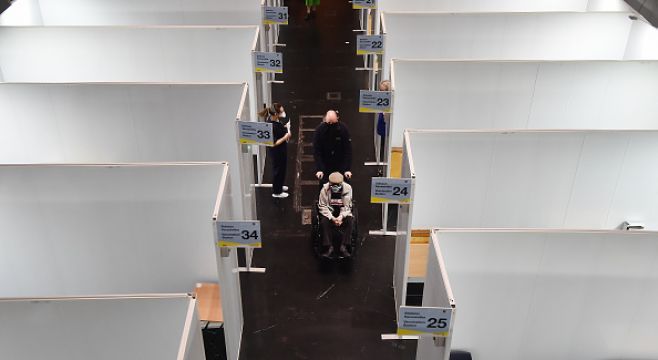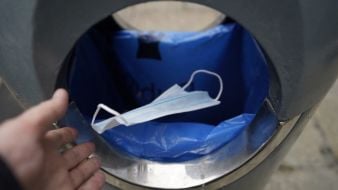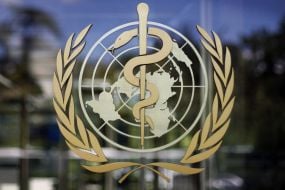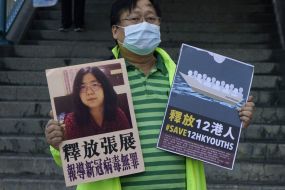The State's Covid vaccine rollout faces more potential delays after recent announcements on the AstraZeneca and Johnson & Johnson jabs.
Thousands of vaccine appointments this week will be rescheduled by the HSE after the National Immunisation Advisory Committee (Niac) said the AstraZeneca vaccine should not be administered to people aged under 60 in the Republic.
Meanwhile, Johnson & Johnson (J&J) said on Tuesday it would delay the rollout of its vaccine in Europe to review cases of extremely rare blood clots in people after they received the shot. Ireland was due to receive its first shipment of the J&J jab this month.
So how will these new developments affect the State's rollout and targets for vaccination?
What has changed with AstraZeneca?
On Monday, Niac recommended that the AstraZeneca vaccine is not given to people aged under 60.
The decision came after the European Medicines Agency (EMA) warned that rare blood clots have been associated with the jab.
Up to 15,000 vaccination appointments were cancelled on Tuesday following the announcement. The majority of people affected by the cancellations were high-risk patients due to receive the jab in hospital or a GP surgery, according to The Irish Times.
The HSE later confirmed that all AstraZeneca vaccination appointments this week were cancelled.
All AstraZeneca COVID-19 vaccination appointments planned for the remainder of this week are cancelled. If you have an appointment to get the AstraZeneca #CovidVaccine this week, you are advised not to attend. We apologise for any inconvenience.
— HSE Ireland (@HSELive) April 13, 2021
Advertisement
Prof Karina Butler, chair of Niac, said the threat of a rare blood clot is “serious”.
She told a press briefing at the Department of Health that the rare blood clotting is estimated to occur in between four and 10 in every million people, one of whom may die.
“However, as so few events have been reported, there is a high level of uncertainty regarding the incidence of this extremely rare adverse event in any particular age group, or gender,” she said.
What happens to people who have already got the AstraZeneca jab?
In its recommendation, Niac said those aged 60 and older who received the AstraZeneca jab should receive their second dose 12 weeks later as scheduled, as should under-60s with a very high-risk or high-risk medical condition.
Those under 60 without a very high-risk or high-risk condition will have the interval between their doses extended to 16 weeks to allow for further assessment of the benefits and risks of the vaccine, as more evidence becomes available.
No one who has received a first dose of the vaccine is due to get a second dose until early May, leaving the health service some breathing space to redraft its plans.
And what about the J&J vaccine?
Health agencies in the US on Tuesday recommended pausing the use of J&J's Covid vaccine as six women under 50 developed rare blood clots after receiving the shot.
The company then announced that it was delaying the rollout in Europe while the blood clot events are reviewed.
The J&J vaccine is one of four vaccines currently cleared by the European Medicines Agency (EMA) for use in the European Union.
The jab, developed by Janssen Pharmaceuticals, which is owned by J&J, is the only single-dose vaccine approved by the EMA.
The European Commission was reportedly seeking clarification from J&J on Tuesday evening about the “completely unexpected” announcement of delays in deliveries.
An EU official told Reuters that the company had confirmed at a meeting on Friday that it would aim to deliver 55 million doses to the EU as contracted by the end of June.
Like other EU countries, Ireland's first deliveries were expected later this week. According to figures published by the Department of Health, 40,800 doses of the J&J vaccine were due to be delivered in April, followed by 132,000 in May and 432,000 in June.
What have the companies said?
J&J said it was working closely with regulators and noted no clear causal relationship had been established between the events and its shot.
AstraZeneca said it was “working to understand individual cases” and “possible mechanisms that could explain these extremely rare events”.
Will this delay Ireland's rollout?
The decision on AstraZeneca will have a short-term impact on vaccinations this week, but the long-term impact is more uncertain.
The HSE and senior health officials were asked to an emergency meeting on Tuesday to evaluate the effects of the AstraZeneca restriction before the news that J&J would pause its European rollout.
The health service has publicly said it is examining the effect of the change in advice on the overall vaccine programme.
Meanwhile, Tánaiste Leo Varadkar confirmed that the Government's goal of administering 180,000 doses this week will not be met.
He told RTÉ's Morning Ireland: “We are not going to hit 180,000 doses this week.
“We will know in the next couple of days if we are going to hit four out of five adults by June.”
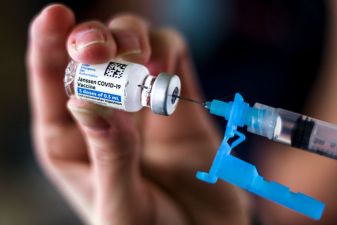
Deputy chief medical officer Dr Ronan Glynn told a news briefing on Monday that the AstraZeneca change does not necessarily mean there will be a delay to the vaccination programme.
“It will likely have an impact – the extent of that impact, though, remains to be seen,” he said.
“It’s not necessarily the case that this will have a material impact or delay on the rollout of the programme at a population level.”
Nevertheless, the news means a further reordering of the State vaccination plan at a time when officials hoped the campaign would begin to accelerate. – Additional reporting: PA, Reuters
